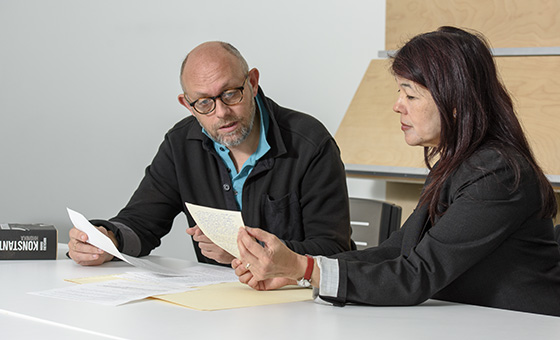 D. Vanessa Kam, Head Librarian, Bowes Art & Architecture Library and Prof. Pavle Levi examine the Samuel Beckett letter.
D. Vanessa Kam, Head Librarian, Bowes Art & Architecture Library and Prof. Pavle Levi examine the Samuel Beckett letter.
Samuel Beckett letter at Stanford opens new opportunities for scholarship
A coffee-stained handwritten letter from renowned Irish playwright and novelist Samuel Beckett to Radomir Konstantinović, a Yugoslav and Serbian writer and philosopher, is now available in Stanford Libraries’ SPECIAL COLLECTIONS. The Beckett-Konstantinović letter at Stanford is one of only about two dozen surviving letters between the two literary figures. Much of their correspondence was lost when Konstantinović’s summer home in Istria was confiscated in the 1990s during the war of Yugoslav disintegration.
The letter was given to Stanford by Konstantinović’s widow, Milica Konstantinović, as a gesture of appreciation for a recent symposium sponsored by the Center for Russian, East European and Eurasian Studies (CREEES) that honored her late husband’s contributions to post-WWII Yugoslav and European literature.
The two met in Paris in 1957 when Konstantinović was interested in translating Beckett’s novel Molloy into Serbo-Croatian. They grew to become pen pals, corresponding over two important decades (1950-1970) for the authors, including Beckett receiving the Nobel Prize in Literature in 1969.“This letter provides Stanford students and scholars with a new point of entry into the intricate web of European literary connections and intellectual exchanges,” said PAVLE LEVI, professor in Art and Art History. “Behind it is the narrative that brings together one of the most celebrated writers of the 20th century and another truly interesting and complex author whose work deserves much stronger recognition in the West.”
“There is something that happens when you are given an opportunity to intimately interact with historical objects,” said VANESSA KAM, head librarian of the Ute & Bill Bowes Art & Architecture Library.
Kam said most students may only encounter Beckett’s works from sources that have already transcribed his notes. But, as she explains, “when you are presented only the original, without interpretation and translation to rely on, the experience is richer and places you within arm’s length of Beckett himself.”
“Having regular access to archives within an active library system is essential for scholars and researchers,” said Levi, who is also the faculty director of CREEES. “That kind of support greatly contributes to the quality of our work.”
